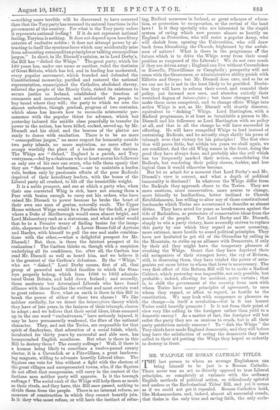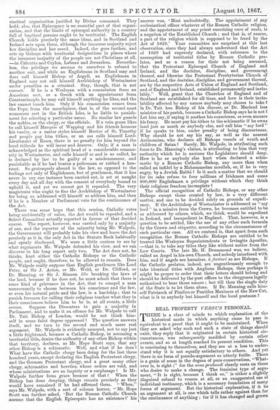MR. WALPOLE ON ROMAN CATHOLIC TITLES.
(111HE last person to whom an average Englishman can 1 bring himself to be just is a Roman Catholic. There never was an act so directly opposed to true Liberal. principles, so completely at variance with the ordinary English methods of political action, so ridiculously spiteful: and useless as the Ecclesiastical Titles' Bill, and yet it seems as if we could not get it repealed. Roman Catholics hold,. like Mohammedans, and, indeed, almost all successful creeds, that theirs is the only true and saving faith, the only cede- siastical organization justified by Divine command. They hold, also, that Episcopacy is an essential part of that organi- zation, and that the limits of episcopal authority in a country full of baptized persons ought to be territorial. The English Church holds precisely the same ideas, and in Scotland and Ireland acts upon them, although the immense majority reject her discipline and her creed. Indeed, she goes further, and sets up bishops with territorial designations in places where the immense majority of the people are not Christians at all, in Calcutta and Ceylon, Labuan and Jerusalem. Neverthe- less, the privilege we assume to ourselves is refused to another sect, and while an Englishman in Scotland may and does call himself Bishop of Argyll, an Englishman in England may not call himself Archbishop of Westminster under penalties as a criminal. Stay, though, that is not correct. If he is a Wesleyan with a commission from an American sect., or a Greek with an appointment from Constantinople, he may call himself anything he likes, and the law cannot touch him. Only if his commission comes from the Pope, from the mouthpiece, that is, of the second most numerous sect in the British Isles, is he liable to punish- ment for selecting a particular name. No similar law guards the nobles, or the clergy, or the officials. If a vain goose likes to call himself Marquis of Wapping and his friends humour his vanity, or a ranter styles himself Rector of St. Timothy and people pay him tithes, or an ass calls himself Lord- Lieutenant of Essex, there is no penalty for him beyond the local ridicule he will incur and deserve. Only, if a man is acknowledged as the spiritual head of a considerable commu- nity in Westminster, and calls himself so and is so called, he is declared by law to be guilty of a misdemeanour, and punishable as if he had beaten a policeman or robbed a hen- roost. So grotesquely absurd is the law, so opposed to the feelings not only of Englishmen, but of gentlemen, that it has never in any one instance been carried out, is set at naught every day and all day with the consent of everybody bound to uphold it, and yet we cannot get it repealed. The very magistrate who ought to fine the Archbishop of Westminster for being so addressed will himself so address him, and then if he is a Member of Parliament vote for the continuance of the Act.
There was some hope that this session, Catholic votes being accidentally of value, the Act would be repealed, and a Select Committee actually reported in favour of that decided course. The report, however, was carried only by a majority of one, and the reporter of the minority being Mr. Walpole, the Government will probably take his view and leave the Act precisely as it is, the only Act in the Statute Book habitually and openly disobeyed. We were a little curious to see by what arguments Mr. Walpole defended his view, and we can discover in his long report only two. The Act does not, he thinks, hurt either the Catholic Bishops or the Catholic people, and ought, therefore, to be allowed to remain. Does Mr. Walpole really suppose that English gentlemen like Lord Petre, or Sir J. Acton, or Mr. Weld, or Dr. Clifford, or Dr. Manning, or Sir J. Simeon like breaking the laws of the land, because if he does not, he must admit that there is some kind of grievance in the Act., that to compel a man unnecessarily to choose between his conscience and the law, or even his natural pride and the law, is a hardship ; that to punish freemen for calling their religious teacher what they in their consciences believe him to be is, at all events, a little severe. Suppose the Dissenters to gain a majority in Parliament, and to make it an offence for Mr. Walpole to call . Dr. Tait Bishop of London, would he not think him- self in some faint degree oppressed ? The question answers itself, and we turn to the second and much more real argument. Mr. Walpole is evidently annoyed, not to say just a little frightened, because a Catholic Bishop, in assuming a territorial title, denies the authority of any other Bishop within that territory, declares, as Mr. Hope Scott says, that any other Bishop is a schismatic. Well, and what if he does ? What have the Catholic clergy been doing for the last three hundred years, except declaring the English Protestant clergy, and the German Protestant clergy, and a great many other clergy, schismatics and heretics, whose orders are void, and whose ministrations are an impiety or a surplusage ? Is Mr. Walpole further from grace because of that ? When the Bishop has done denying, things remain precisely as they would have remained if he had affirmed them. " When," says Mr. Walpole, with a sort of solomn horror, " Mr. Hope Scott was further asked, 'But the Roman Catholic Church assume that the English Episcopate has no existence ?' his answer was, Most undoubtedly. The appointment of any ecclesiastical officer whatever of the Roman Catholic religion, and the appointment of any priest exercising cure of souls, is a negation of the Established Church ; and that is, of course, a part of the religion which is supposed to be freed by the Act of 1829.' Your committee are surprised at this last observation, since they had always understood that the Act of 1829 had expressly declared, with reference to the assumption of territorial titles by Roman Catholic pre- lates, and as a reason for their not being assumed, that the Protestant Episcopal Church of England and Ireland, and the doctrine, discipline, and government thereof, and likewise the Protestant Presbyterian Church o Scotland, and the doctrine, discipline, and government thereof, are by the respective Acts of Union of England and Scotland,_ and of England and Ireland, established permanently and invio-. lably." Well, grant that the Churches of England and of Scotland are established for all time, and how is their invio- lability affected by any names anybody may choose to take ? Is Dr. Tait less Bishop of his diocese, or Dr. Macleod less minister of his parish, because a Catholic Bishop says he is not ? Let him say, if saying it soothes his conscience, or even amuses his fancy. He must pay his tithes to the schismatic if he owns land just as much as anybody else, and call him " my lord " if he speaks to him, under penalty of being discourteous. Why should he not say his say, as well as the nearest Antinomian, who declares all Bishops vessels of wrath and children of Satan ? Surely, Mr. Walpole, in attributing such force to Dr. Manning's claims, is attributing to him that very authority which he is anxious the Legislature should deny. How is he or anybody else hurt when declared a schis- matic by a Roman Catholic Bishop, any more than when called an infidel by a Mohammedan moollah, or, if he is very angry, by a Jewish Rabbi ? Is it such a matter that we should for its sake refuse to four millions of Irishmen and some 800,000 Englishmen a privilege without which they think their religions freedom incomplete ?
The official recognition of Catholic Bishops, or any other Bishops except those created by law, is a very different matter, and one to be decided solely on grounds of expedi- ency. If the Archbishop of Westminster is addressed as "my lord " in a missive from the Crown, he becomes entitled to be so addressed by others, which, we think, would be expedient in Ireland, and inexpedient in England. That, however, is a question to be settled, like the use of any other such formula by the Crown and etiquette, according to the circumstances of each particular case. All we contend is, that apart from such recognition the Roman Catholic Bishops are entitled to be treated like Wesleyan Superintendents or Irvingite Apostles, —that is, to take any titles they like without notice from the Law Courts. The late Mr. H. Drummond was, we believe, called an Angel in his own Church, and nobody interfered with him, and if angels are harmless, a fortiori so are Bishops. If the Catholic prelates, indeed, are ungentlemanly enough to take identical titles with Anglican Bishops, then perhaps it might be proper to order that their letters should belong and should be delivered by the post offices to the clergymen legally authorized to bear those names ; but till then the single duty of the State is to let them alone. If Dr. Manning calls him- self Patriarch of Pimlico or Pontifex Maximus of the New Cut, what is it to anybody but himself and the local postman ?































 Previous page
Previous page